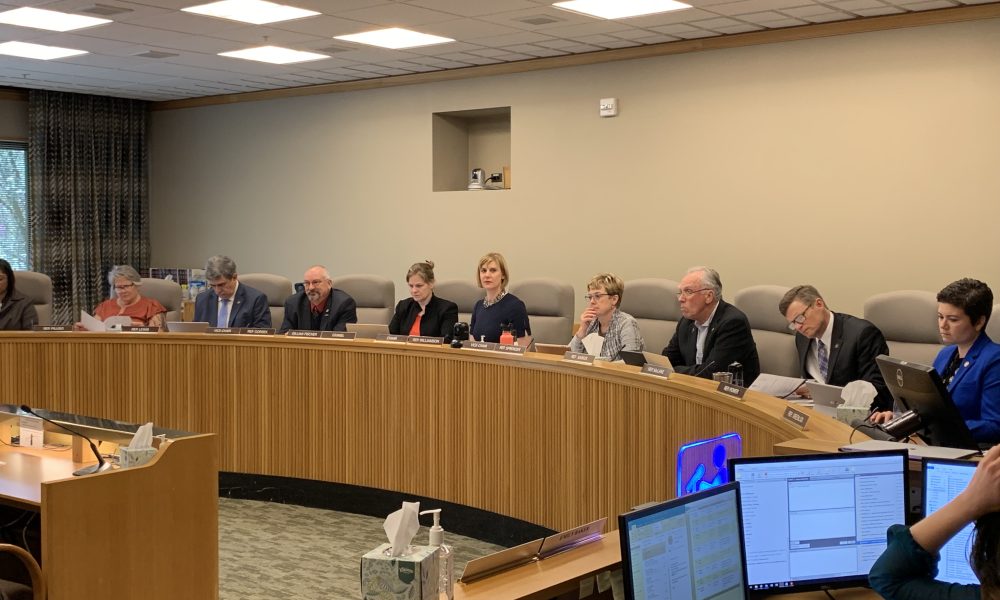 The House Judiciary Committee (Aubrey Wieber/Salem Reporter)
The House Judiciary Committee (Aubrey Wieber/Salem Reporter)
The American Civil Liberties Union of Oregon has found that at least 40 percent of the state’s district attorneys don’t have written policies to guide their core work.
These policies could outline whether to charge teenagers accused of certain crimes as adults or juveniles, whether to pursue tougher sentences via Oregon’s Measure 11 or what sort of plea deals for minor crimes like drug possession are most appropriate.
The report’s findings are manifested in a legislative proposal, House Bill 3224, which appears to be well on its way out of committee. The proposal would require district attorneys to write policies regarding charging, discovery and plea deals and post them on their websites by Dec. 1, 2020.
The reforms were sponsored by state Rep. Jennifer Williamson, D-Portland, who is the House majority leader, and and Carla Piluso, D-Gresham, also has cosponsors ranging from some of the most liberal to the most conservative members of the Legislature.
The House Judiciary Committee gave the bill an airing Thursday at a public hearing and is scheduled to work on the bill again Monday. The Oregon District Attorneys Association supports the concept of having written policies but wants to modify the proposal.
“I think it’s an untenable situation to oppose really, things like basic written policies around the core functions of their work when the decisions they’ve been making on a daily basis can have such huge impacts on the lives of Oregonians,” said David Rogers, ACLU’s executive director.
Williamson said such policies provide deputy prosecutors clear guidelines on how the district attorney wants the office run and it provides transparency to the public.
In the report, Rogers wrote that district attorneys are the most powerful force in the criminal justice system because their singular authority to decide whether and how to charge someone.
“Prosecutorial discretion is a huge driver in our entire criminal justice system, and if we don’t know what influences their discretionary decisions around how people are charged, then as voters it’s impossible to make an informed choice about an elected official,” Williamson told Salem Reporter.
When a district attorney is elected, they take leadership of an office that likely includes veteran prosecutors who could have worked for several bosses over the years with differing outlooks on the criminal justice system.
Williamson said having a written guide would helps everyone in the office perform uniformly. Williamson said she’s been told by deputy prosecutors that after a certain amount of time on the job, they make decisions based on a “gut check.”
“I don’t think that’s an appropriate way for our criminal justice system to be managing peoples’ lives,” Williamson said. “For voters, there’s no way to know whether or not you’re dealing with a DA’s office where somebody fresh out of law school is trying to learn the ‘gut-check’ model of charging people.”
ACLU Oregon sent a records request to all 36 district attorneys, asking for written policy guidelines. Fifteen offices responded saying they had no guidelines. Four had written guides for about 20 percent of functions the ACLU found to be critical to operation. Ten, including Marion County, had guidelines covering 20 to 60 percent of essential functions.
Three – Deschutes, Clackamas and Multnomah counties – had comprehensive guidelines.
Marion County District Attorney Paige testified on behalf of her office and the state’s district attorneys, saying they generally supported written policies but wanted to change some things. When asked to detail the amendments, she said they were just minor clarifications in the bill’s language.
Clarkson strongly disagreed with the assertion that prosecutors are the most powerful people in the system, saying it’s designed with checks and balances so that there is no one party is more powerful than another.
The District Attorneys Association has long had a reputation in Oregon for being powerful and unwavering, Rogers and Williamson said. Williamson said the district attorneys that have been in power for years have built a system that unevenly targets minorities. Many of those district attorneys are still in power, and work to silence newer progressive district attorneys, Williamson said.
“I’ve heard there is a lot of pressure to fall in line,” she said. “I think it is a difficult place to push back on the old guard.”
“They are just a very tough group of people to work with, and if you question them or push back on them at all, they can be unkind,” Williamson said.
Kimberly McCullough, legislative director for ACLU Oregon, said the District Attorneys Association has opposed ACLU ideas “with great frequency.” She and Rogers said public opinion on the criminal justice system has changed over the years, and they are hopeful that is pushing the district attorneys as well.
Charlie Peirson, a public defender for Multnomah Defenders Inc., testified that the proposal goes beyond checking prosecutors. It would help defense attorneys like himself have a sense of a district attorney’s standards before deciding how to represent a defendant. It also would give citizens a way of determining when a prosecutor deviates from the office norm on a case. District attorneys have an ethical obligation to seek justice, but that interpretation can vary. Let’s get it in writing, he said.
“Put flesh on those bones and tell me how you are going to carry out that ethical obligation,” Peirson said.
Reporter Aubrey Wieber: [email protected] or 503-575-1251.
A note from our editor:
Thank you for reading another example of our local journalism. This kind of work takes paid professionals and we rely on subscribers to support this work. If you haven’t yet signed on as a Salem Reporter subscriber, please ensure you get more of these kinds of stories with your subscription: Click HERE. Thank you. — Les Zaitz, editor









